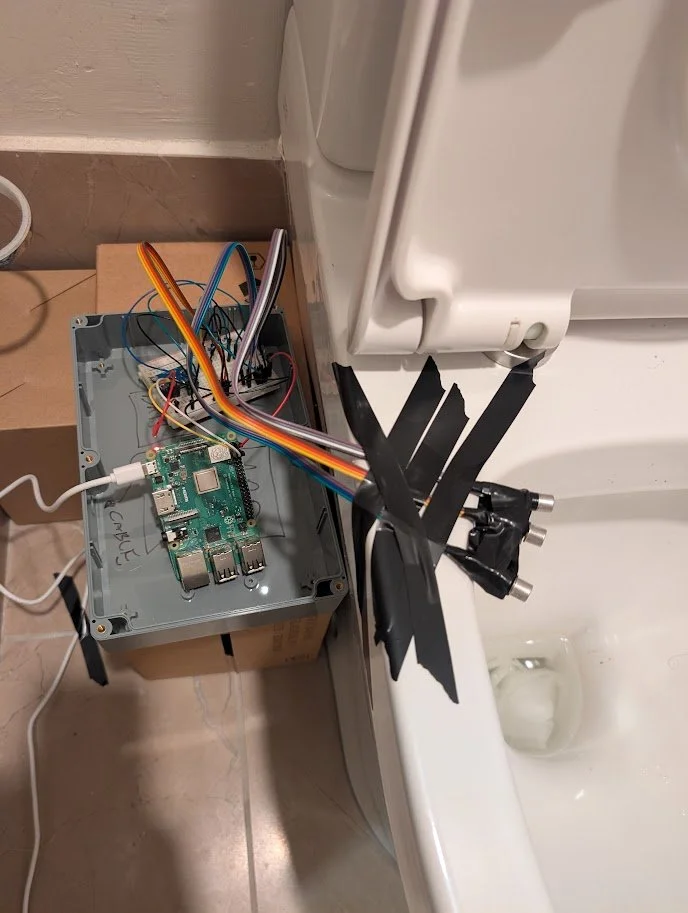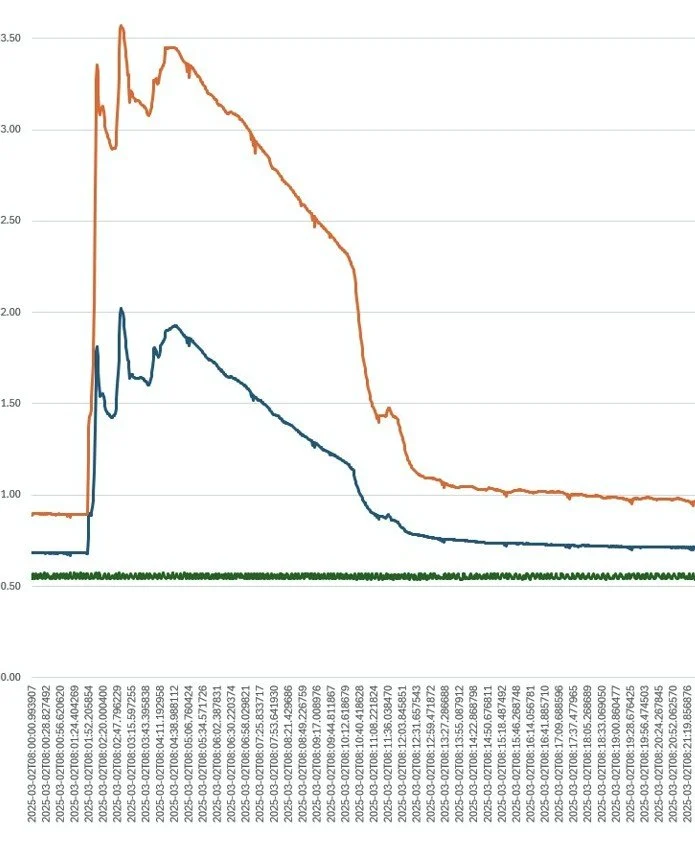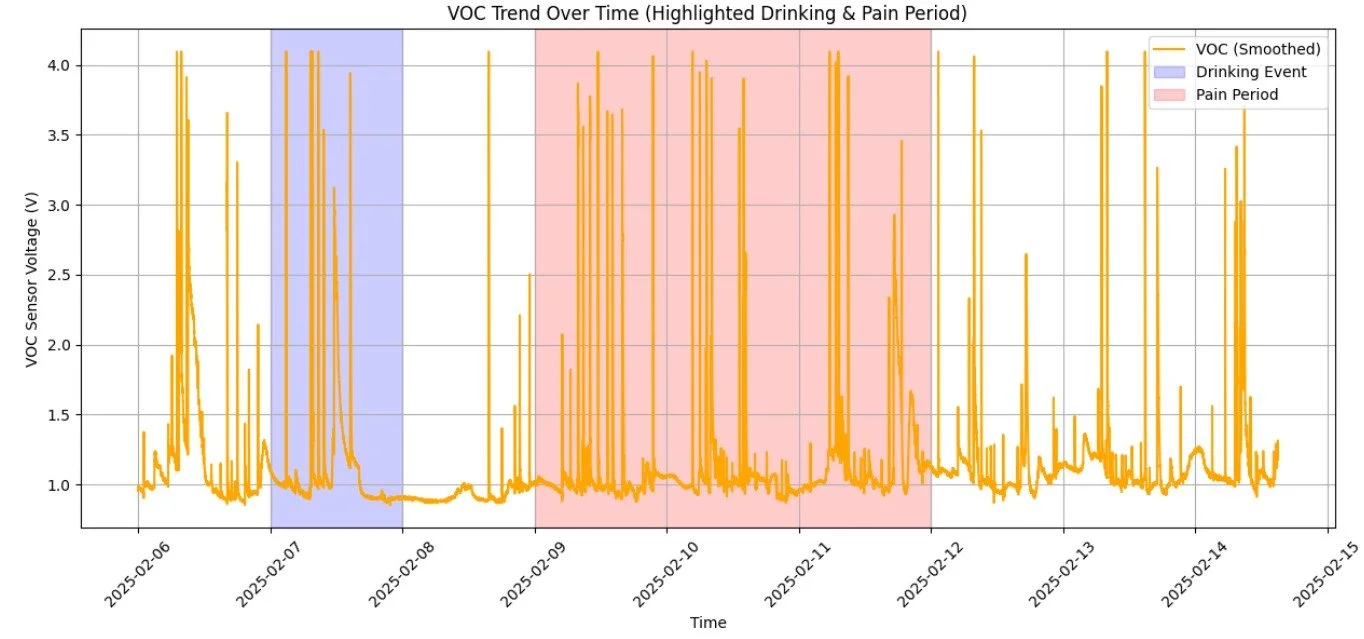Breaking New Ground: How Our Version 1 Prototype Proved That Smart Toilets Can Detect Gut Health Changes
If you’ve ever suffered from diverticulitis, you know the frustration of flare-ups that seem to strike without warning. By the time symptoms become severe, it’s often too late to prevent the worst, leading to pain, restricted diets, and, in many cases, antibiotics.
But what if there was a way to detect a flare-up before it fully develops—early enough to take action and potentially avoid the worst symptoms altogether?
The assembled V1 prototype fitted in the toilet
That’s the question we set out to answer with our Version 1 prototype of IntelliGut. Would sensors placed inside a toilet be sensitive enough to detect changes in gut-related gases? Could we find meaningful patterns that an AI model could later use to provide an early warning system?
The results? Far more promising than we expected.
The Big Question: Can Gut Gases Reveal Flare-Ups Before Symptoms Start?
Our hypothesis was simple:
✔️ Gut microbiota produce gases as part of digestion.
✔️ When inflammation occurs, bacterial populations and their gas production patterns shift.
✔️ These changes should be detectable before noticeable symptoms appear.
We built our first prototype with a basic sensor array capable of detecting key gases, including:
🔬 Methane (CH₄) – Linked to slow digestion and potential bacterial overgrowth.
🔬 Hydrogen Sulfide (H₂S) – Associated with inflammation and dysbiosis.
🔬 Volatile Organic Compounds (VOCs) – A broad category of gut microbial byproducts.
🔬 Ammonia (NH₃) – Related to protein metabolism and gut irritation.
Would these sensors pick up real, measurable patterns during defecation?
Data collected from the toilet saensors for a single defecation event
What We Found: The Data Was Surprisingly Rich and Actionable
After analyzing multiple defecation events, we were amazed to see that our sensors were:
✅ Extremely sensitive to small fluctuations in gas concentrations.
✅ Clearly distinguishing “normal” events from events that stood out as “different.”
✅ Showing patterns that we believe AI can learn from to predict gut health trends.
Take a look at one of our early fluctuation graphs (see image below). This was a major "mind-blown" moment for us. The sensors weren’t just picking up random noise; they were collecting data that actually meant something.
After a big night out drinking alcohol the sensors measured inflammation inside the gut !
We could see when gas concentrations changed dramatically during certain toilet events—potentially signaling early signs of inflammation or microbial shifts.
This was a game-changer. If sensors can detect these changes reliably, AI can learn from them—and that means early warning alerts could become a reality.
Expanding the Vision: From Diverticulitis to Gut Health Optimization
Our initial focus was on diverticulitis because of its unpredictable nature and the urgent need for early intervention. But after seeing the depth of the data, we realized this technology could be applied to many other gut conditions, including:
🔹 IBS (Irritable Bowel Syndrome) – Tracking gas fluctuations to correlate with symptom triggers.
🔹 SIBO (Small Intestinal Bacterial Overgrowth) – Measuring methane and hydrogen levels over time.
🔹 Inflammatory Bowel Disease (IBD) – Looking at VOC signatures for inflammation patterns.
🔹 General Gut Health Optimization – Understanding how diet, stress, and lifestyle impact the microbiome.
We’re no longer just building an early warning system for flare-ups. We’re creating a way for people to take control of their gut health with real, personalized data.
What’s Next: More Sensors, More AI, More Insights
After proving that sensors can detect meaningful changes, we’re taking the next steps:
📌 Upgrading our sensor suite – Adding even more sensors to measure good bacteria gas, in addition to bad bacteria gas.
📌 Expanding AI training – Feeding our data into machine learning models to refine predictive capabilities.
📌 Building a broader beta program – Testing IntelliGut with more users to personalize and validate real-world accuracy.
Want to Be Part of This Gut Health Revolution?
We’re actively looking for beta testers to join us in refining the next stage of IntelliGut. If you:
✅ Have diverticulitis, IBS, or another gut health concern…
✅ Want to understand your gut like never before…
✅ Are excited about cutting-edge health technology…
Then join our beta program and help shape the future of gut health monitoring. Click here to sign up!
📍 Join the IntelliGut Beta Program
Final Thought: The Future of Gut Health is Passive, Predictive, and Personalized
This is just the beginning. With AI-driven sensor technology, we’re stepping into a world where gut health is no longer a guessing game.
No more wondering if a flare-up is coming—just real-time, personalized insights that put you back in control.
🚀 The gut health revolution is here. Are you ready?





